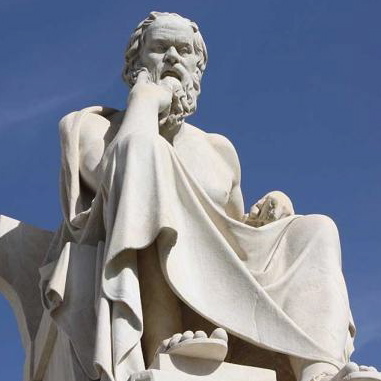
Philosophy plays a big part in the Henleaze Junior School Curriculum.
To be more specific, P4C, or Philosophy For Children.
Every class looks forward to Mr Barber's Philosophy Afternoons three times a year, and the principles of philosophical enquiry underpin the way we approach discussion in all lessons.
Those that want to engage in more enquiries join The Philosophy Society, a lunchtime club run by Mr Barber.
What does Philosophy look like at HJS?
We define philosophy as a way of thinking and communicating. By developing the skills necessary for philosophical enquiry, we learn how to listen, how to ask helpful questions, how to challenge ideas, and how to change our minds in the light of what we hear.
By taking a philosophical approach to discussion in any lesson, we are able to delve deeper into the subject and as a result, there is more likelihood that what we learn will stay with us. in philosophy, it is the ideas that matter, not the personality of the person who expresses the ideas.
"I agree with," or "I disagree with" are very common sentence openers in our philosophical enquiries, but always followed by an explanation. Our response has to show that we have listened carefully and considered what has been said, made connections with other contributions or with our own experience, and come up with a thought that we are happy to share with others.
The most important starting point for any philosophical discussion is that everyone goes into it with an open mind, prepared to change their views, and prepared to respect and value equally everyone's contributions. We don't necessarily expect everyone to reach agreement: in that sense, it is not like a debate, where there is a winning side. It is a very valuable lesson to learn that there is not always a cut and dried answer at the end of a discussion, and sometimes it is necessary to agree to disagree. in this way, we learn to respect differences of opinion.
Community Of Enquiry
A typical philosophy session follows a format defined by P4C, or Philosophy For Children. We sit in a circle, where everyone is equal and everyone can make eye contact, and we have an agreed set of rules, which typically look like this:
Listen to the speaker
Only one speaker at a time
There are no right or wrong answers
Respond to what you hear
Think about what you think

The picture is taken from a rather grand building in Ragusa, Sicily which appears to have been built in the 19th century as a place for noblemen to meet and discuss politics. There were different "circoli" for different groups: right opposite is one for fisherman, and up the road, one for builders! At HJS, our "circolo di conversazione" includes everyone.
An enquiry typically starts with a story or a picture, or sometimes an object or a piece of music. Children talk to each other in pairs and we then hear everyone's first thoughts. The children then suggest questions for further discussion. This is the key: learning to come up with the sort of questions that stimulate conversation. The teacher's role is to make sure everyone has a fair chance to contribute, and occasionally to intervene to bring the discussion back on track or to ask follow up questions. For the most part, it is the children that do the talking, and the teacher allows them to take it in whatever direction interests them. This is one of the reasons why it works so well for all of the children: it is guaranteed to be a conversation that interests them.
Why is Philosophy worthwhile?
- It doesn't have to have a fixed endpoint.
- It is good to hear what your peers think - they may have a different viewpoint, or a different way of looking at things.
- Some children can shine and everyone can participate - it is totally inclusive.
- It promotes the idea of being critical, not just accepting things as given.
- It teaches pupils to respect people with different views.
- It is an opportunity for pupils to express themselves and their viewpoints.
- It gives children time to reflect and time to explore their thoughts.
- It is a non-threatening way to take risks and experiment with ideas.
How does Philosophy support learning across the curriculum?
The habits acquired in philosophical enquiry are applied to excellent effect in Literacy, especially when it comes to reading comprehension. Children are able to imagine what the author or a particular character might have had in mind, and are able to add detail and evidence to their responses about texts.
The philosophical approach is equally valid in Maths and Science, where the requirement to use words precisely and unambiguously helps them to be certain that they understand the mathematical and scientific facts and methods. It enables them to prove or justify their answers, responding to questions such as "What makes you think that?" or "Supposing you did this, what then?"
There is no subject that cannot benefit from the ability to ask and respond to provocative questions. In History, we understand more about the reasons for events if we can explore the thinking behind them. In Geography, we can make more sense of how the world is and how it is changing if we can discuss the impact of natural or human-led actions.
There are strong links between the structure of a Community of Enquiry and Circle Time, which is a feature of the PSHE curriculum. In Circle time, children might be encouraged to talk more about their feelings and emotions, but the structures they use, and the principles of respect and equality, are exactly the same as in P4C. Philosophy gives them a vocabulary, and the confidence to voice their thoughts and opinions.
The ability to talk articulately, and to listen carefully to others, equips children for secondary school, further education, and the world of work.